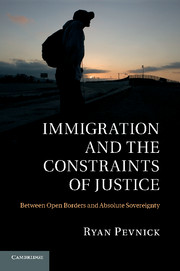Book contents
- Frontmatter
- Contents
- List of illustrations
- Acknowledgments
- 1 Introduction
- 2 Statism, self-determination, and associative ownership
- 3 Refining associative ownership
- 4 Rights-based arguments for open borders
- 5 Distributive justice and open borders
- 6 The significance of national identity
- 7 Applications
- Bibliography
- Index
3 - Refining associative ownership
Published online by Cambridge University Press: 24 February 2011
- Frontmatter
- Contents
- List of illustrations
- Acknowledgments
- 1 Introduction
- 2 Statism, self-determination, and associative ownership
- 3 Refining associative ownership
- 4 Rights-based arguments for open borders
- 5 Distributive justice and open borders
- 6 The significance of national identity
- 7 Applications
- Bibliography
- Index
Summary
In this chapter, I continue to refine the associative ownership position in order to further explain how it can helpfully frame our thinking about debates regarding immigration by answering a number of potential objections to the position. Recall that according to the associative ownership view, the state is an association stretching through time, whose members – through their contributions – fulfill important needs and provide necessary goods for one another. Goods provided through associational relationships include protection from internal and external threats, risk-protection schemes (such as public healthcare or pension programs), and programs facilitating the achievements of members (such as publicly supported higher education programs).
Such goods only exist through the coordinated decisions, labor, and contributions of members. Given this, members may come, through their efforts, to have an entitlement to the accomplishments and misdeeds of the community. If this is plausible, members of the community are in a position to legitimately deny membership to some outsiders because this entitlement amounts to a prima facie privilege to do with it, within boundaries, what they wish. This, as we saw, is one way (perhaps there are others) of justifying the quotidian claim to self-determination. On this view, political communities have a rightful claim to selecting their path forward because they have claims of ownership over the goods at stake. Rather than seeing the goods at stake in arguments about immigration – as most of the literature on the ethics of immigration implicitly does – as goods over which nobody has strong claims, we should instead recognize them as goods created and passed down through an intergenerational political community.
- Type
- Chapter
- Information
- Immigration and the Constraints of JusticeBetween Open Borders and Absolute Sovereignty, pp. 53 - 77Publisher: Cambridge University PressPrint publication year: 2011

